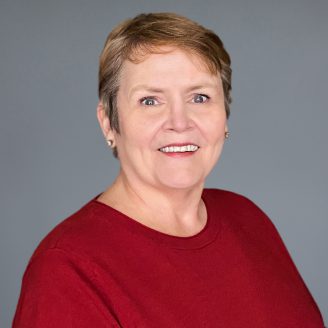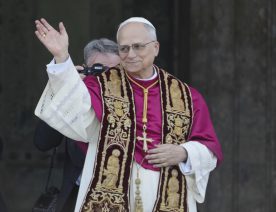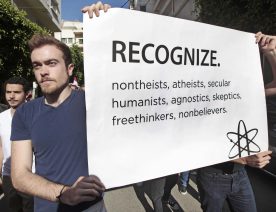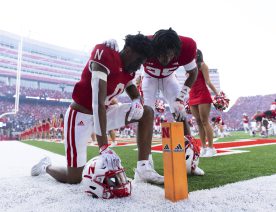
June 26, 2025
The public has nuanced views about the role of religion in public schools. Just over half of adults think schools should be allowed to have chaplains available to provide support services, but under half think it’s okay for teachers to lead a class in prayer. More people oppose than support policies that would allow religious schools to become tax-funded public charter schools, but there is about equal support and opposition for a policy that would allow school vouchers to be used at private or religious schools.
Attitudes about the role of religion in school are often shared across religious groups, especially white evangelical Christians and nonwhite Protestants, even though they have different partisan alignments.
Fifty-five percent of adults think teachers should not be allowed to lead a public-school class in prayer, aligning with the public’s sentiment in a September 2022 AP-NORC Poll. Six in ten also say that schools should not be allowed to hold a mandatory period for private prayer and religious reading. But 58% think it is okay for religious chaplains to provide support services to students at public schools.
White evangelical Christians, nonwhite Protestants, and Catholics are all more likely than those who are not affiliated with a religion to approve of religious chaplains providing support services, teachers leading prayer in class, and mandatory periods for private prayer and religious reading at public schools. Though white mainline Protestants are not significantly different in their attitudes from those who do not have a religious affiliation when it comes to mandatory prayer periods and religious chaplains in public schools, they are more likely to support teachers leading a prayer in class.
Republicans are more likely than Democrats to think religious chaplains providing support services in public schools (70% v. 47%), teacher led prayers (60% v. 29%), and mandatory school prayer periods (49% v. 27%) should be allowed.
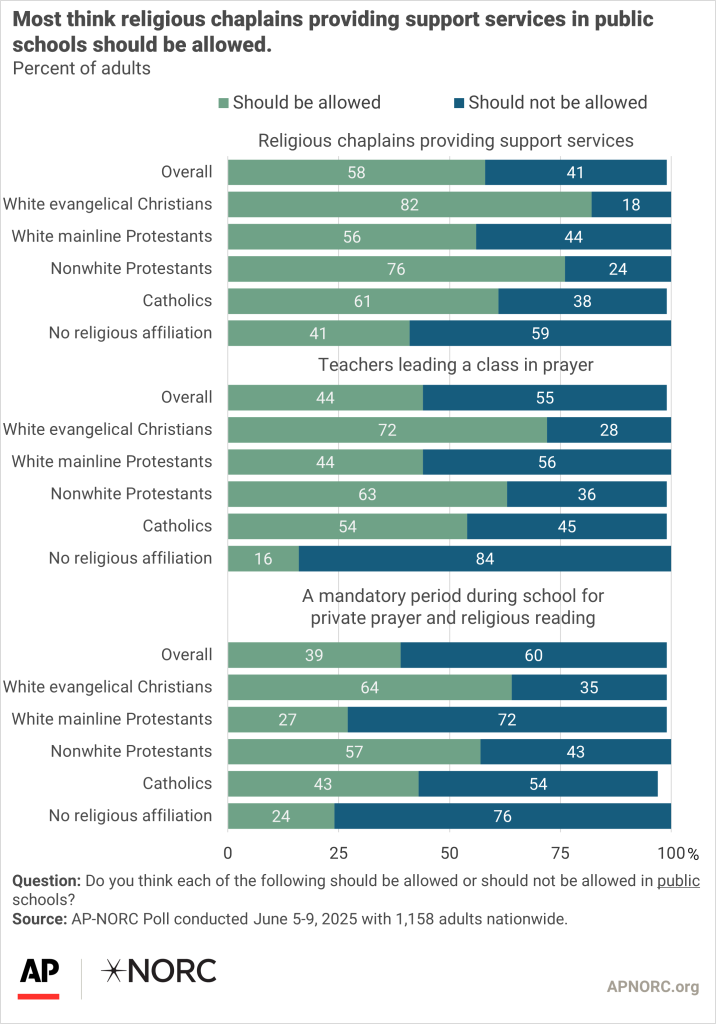
Roughly a quarter to a third of the public lack firm opinions about several policies on the integration of religion and public education. Among those with opinions on these issues, more oppose than support religious exemptions for childhood vaccines that are required for public school students and allowing religious schools to become tax-funded public charter schools. People are roughly split on their support or opposition to tax funded vouchers that help parents pay for tuition for their children to attend private or religious schools instead of public schools. More favor than oppose requiring public schools to provide parents with lists of books that are available to students.
Those without a religious affiliation are less likely than white evangelical Christians or nonwhite Protestants to favor each of the items. Aside from religious exemptions for childhood vaccines, Catholics are also more likely to support the policies than those who are not religiously affiliated. White mainline Protestants are also more inclined to approve of allowing religious schools to become tax-funded public charter schools than those who are not religiously affiliated.
More Republicans than Democrats approve of requiring public schools to provide parents with lists of books available to students (67% v. 40%), tax-funded vouchers that help pay for a child’s tuition at a private school (47% v. 26%), religious exemptions for vaccines typically required at public schools (40% v. 14%), and allowing religious schools to become tax funded public charter schools (32% v. 15%).
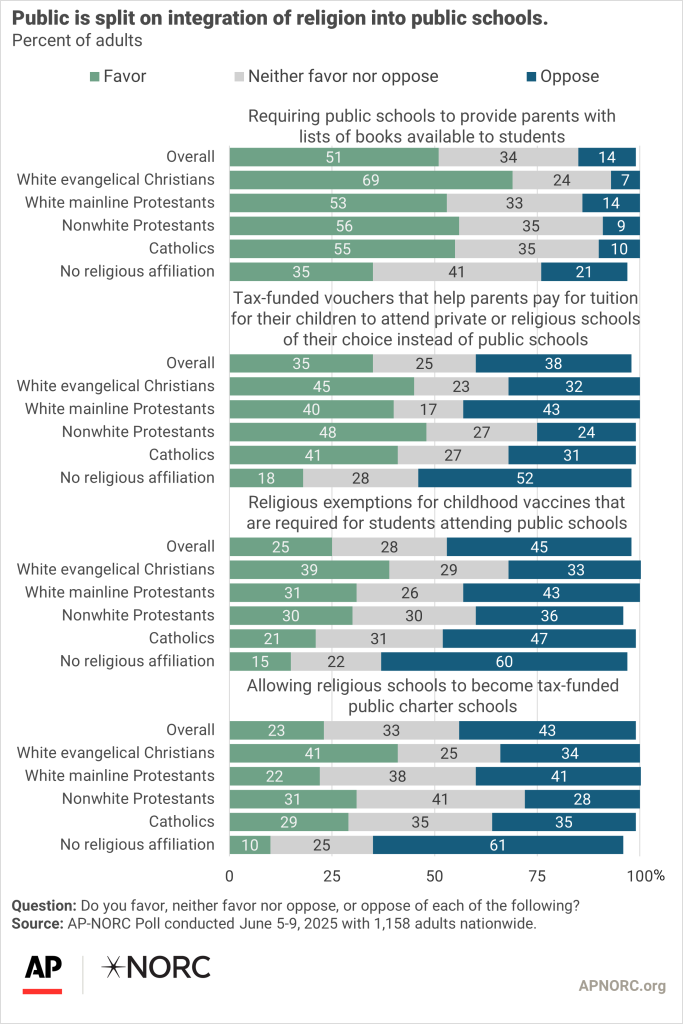
A majority of adults agree that parents have too little influence on their children’s education in public schools and that the federal government has too much. About half say teachers have too little influence and that state governments have too much.
Republicans are more likely than Democrats to say parents have too little input (73% vs. 37%), while Democrats are more likely to say teachers have too little influence (55% vs. 38%).
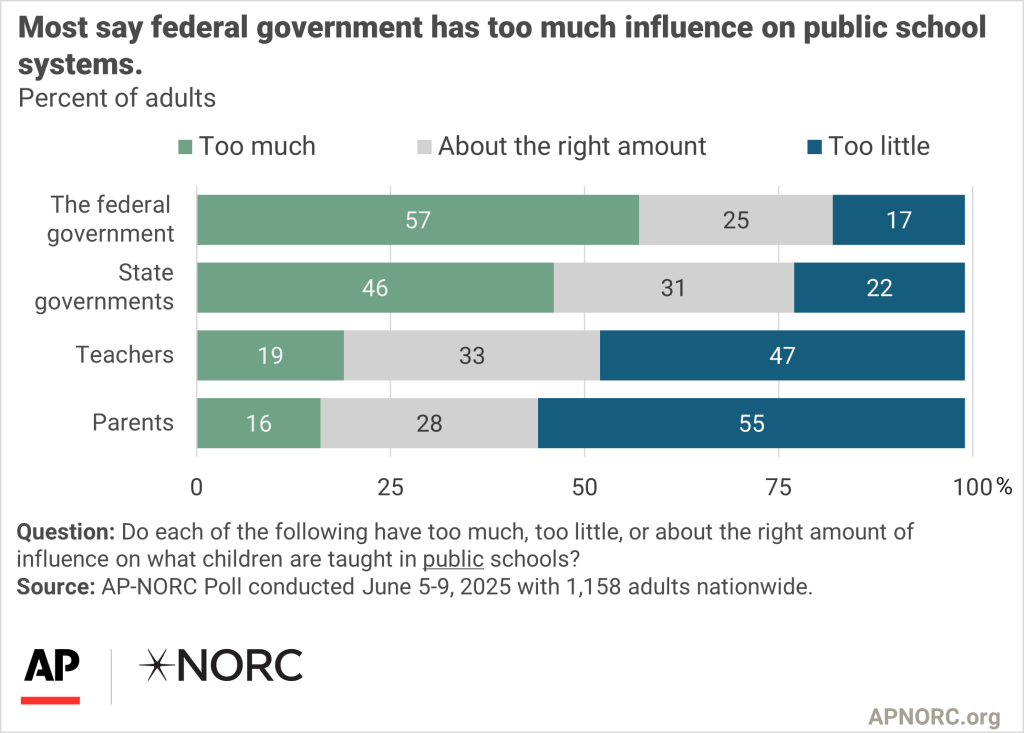
Most consider freedom of religion, speech, and the press, and the separation of church and state as very or extremely important to the United States’ identity as a nation. However, more people think freedom of religion and speech are important than freedom of the press or the separation of church and state. These figures align with a March 2024 AP-NORC Poll.
Democrats place more importance than Republicans on the freedom of the press (80% v. 64%) and the separation of church and state (73% v. 55%). Large majorities of both parties see freedom of speech (87% and 86%) and religion (83% and 81%) as important.
White evangelical Christians and nonwhite Protestants are more likely to say freedom of religion is very important than adults without a religious affiliation (91% and 86% v. 75%). Those not religiously affiliated are also more likely to prioritize the separation of church and state than Catholics (71% v. 56%), but not more than nonwhite Protestants, white evangelical Christians, or white mainline Protestants.
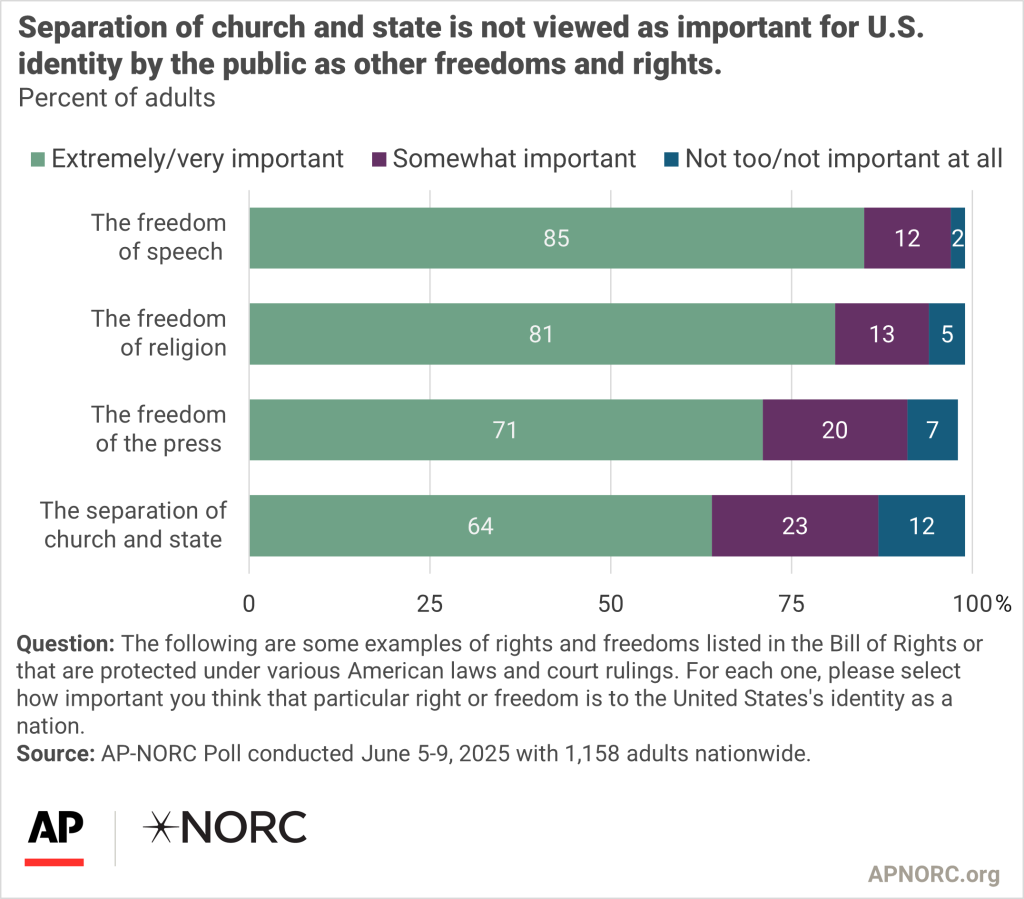
People are more likely to think religion has too much than too little influence on the U.S. Supreme Court and President Trump. Views are more divided on the influence of religion on state government and public-school curricula. These figures have stayed about the same since August 2018.
Those who are not religiously affiliated are more likely to say religion has too much influence on President Trump, the U.S. Supreme Court, and what children are taught in public schools compared with white evangelical Christians, white mainline Protestants, nonwhite Protestants, or Catholics. White evangelicals and Catholics are more likely than those without a religious affiliation say religion has too little influence on state governments.
Democrats tend to think religion has too much influence on Trump (65% v. 14%), the U.S. Supreme Court (57% v. 17%), the public-school curriculum (47% v. 15%), or state governments (44% v. 18%) compared with Republicans.
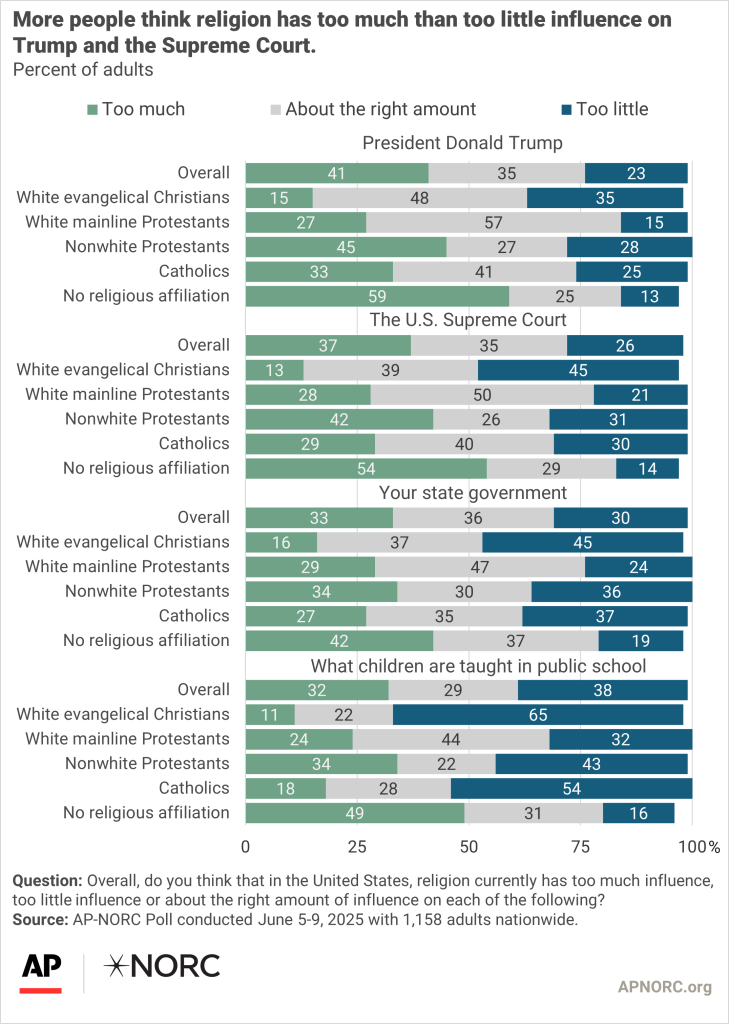
About half of adults say that Muslims and evangelical Christians have the right amount of influence in American politics. Slightly more say the same about Catholics and Jewish people. More people think evangelical Christians and Catholics have too much influence than too little.
Democrats are more likely than Republicans to say evangelical Christians (52% v. 17%) have too much influence. More Republicans than Democrats feel Muslims have too much influence (39% v. 17%). There are no partisan differences in views of the influence of Jewish people on American politics.
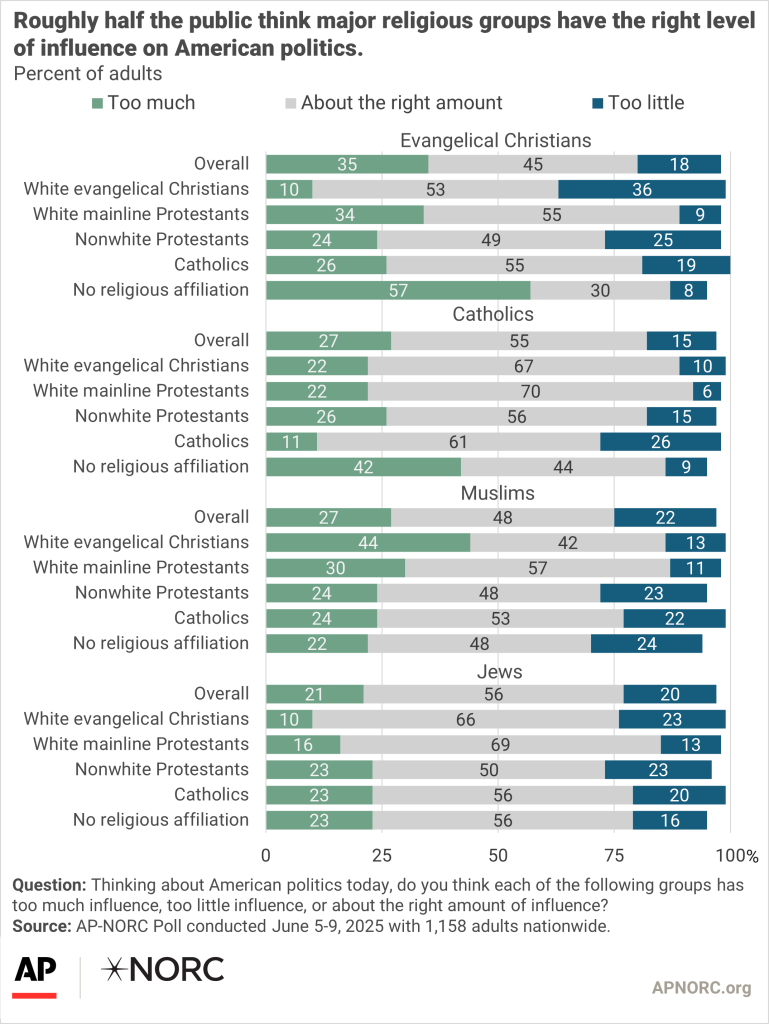
Most are not concerned that the religious freedom of atheists or Christians is being threatened in the United States. About half feel the same way about Muslims. Forty-one percent are not concerned about Jewish people’s religious freedom being threatened.
Democrats are more concerned that the religious freedoms of Muslims (36% v. 13%) and atheists (24% v. 10%) are being threatened while Republicans worry more about Christians (32% v. 15%). There are no partisan differences in concerns about religious freedom for Jews.
White evangelical Christians (39%), nonwhite Protestants (31%), and Catholics (24%) are all more likely to be very or extremely concerned about the religious freedom of Christians than those who do not have a religious affiliation (7%). Those without a religious affiliation are more likely than white evangelical Christians to be at least somewhat concerned about the religious freedom of atheists (45% v. 27%).
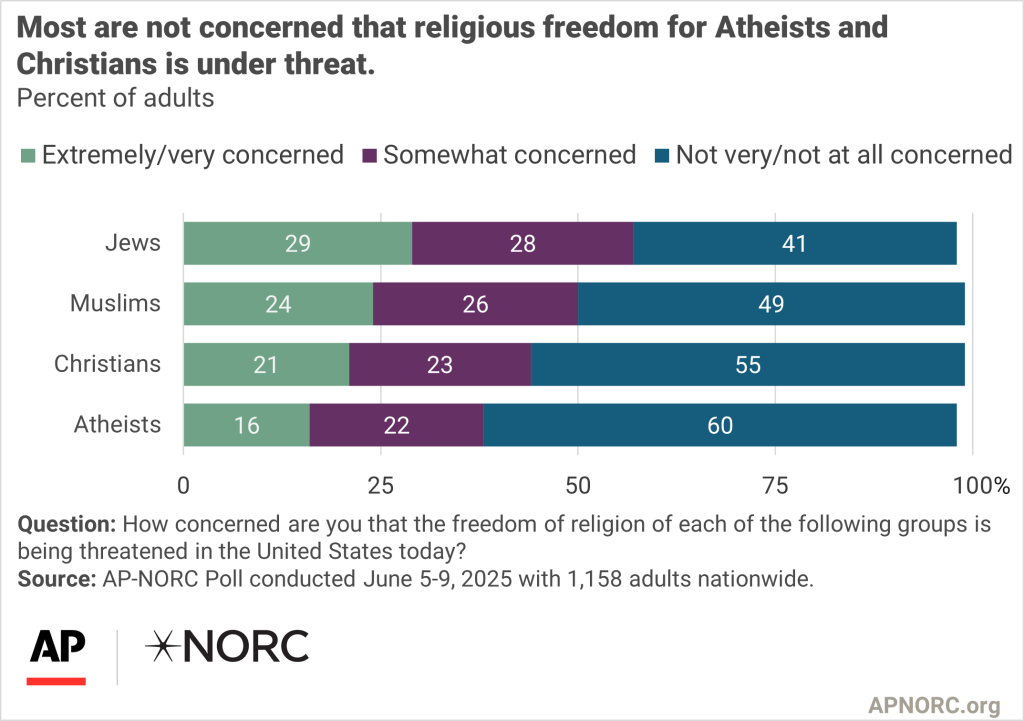
The nationwide poll was conducted June 5-9, 2025 using the AmeriSpeak® Panel, the probability-based panel of NORC at the University of Chicago. Online and telephone interviews using landlines and cell phones were conducted with 1,158 adults. The overall margin of sampling error is +/- 4.0 percentage points.
- Suggested Citation: AP-NORC Center for Public Affairs Research. “The public holds nuanced views on the role of religion in public schools.” (June 2025). https://apnorc.org/projects/the-public-holds-nuanced-views-on-the-role-of-religion-in-public-schools/




